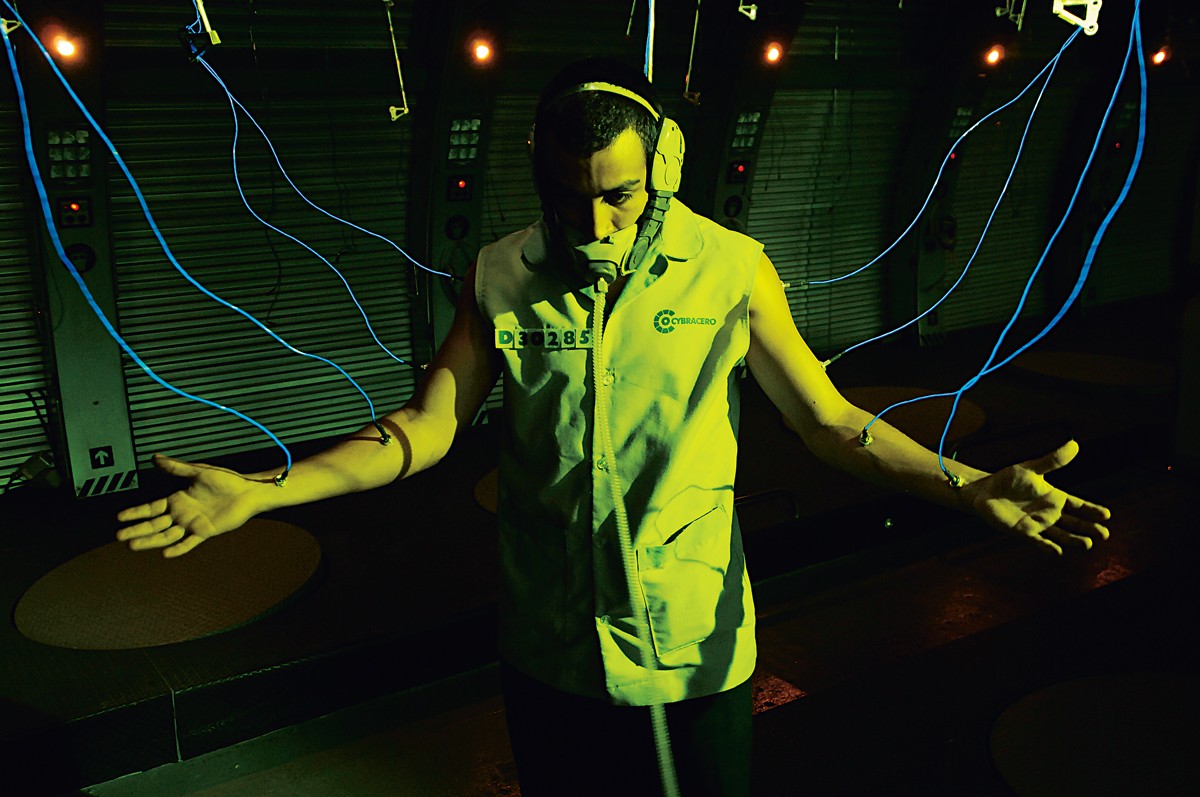Remote Warfare, Automation, and Digital Labor: Why Alex Rivera’s 2008 Film SLEEP DEALER is Still Relevant

In Alex Rivera’s Creative Capital Project, Sleep Dealer, migrant workers perform their physical labor in the United States from abroad using remote-controlled drones, while they remain in their home country. The laborers are restricted by law from traveling across the border to the country where their work is actually done. It’s a future that’s more or less real today, yet it was surprisingly prescient when the film premiered at Sundance Film Festival in 2008, and especially when Rivera started working on it in the late ‘90s. The sci-fi film tells the story of Memo Cruz, a young man from Mexico who, unable to cross the border to live in the US, “migrates” over the internet.
The initial inspiration for the film came around 1997 when the internet was still in its infancy. Rivera read an article in Wired magazine that imagined a future where digital technology was more developed, and everyone would work from home and telecommute. The article was hopeful about this new future, and predicted that traffic would disappear as everyone would eventually work from home. “One of the things I like to do, as an artist,” Rivera told us recently, “when I see words like ‘everyone’ being used in these fantasies, is put my family into it—can my family work from home in the future?”
Rivera’s family is split between Peru and the US, and at the time many of them were trying to come to the US for work, often without papers, to do manual labor. “So, I questioned myself: could my immigrant family ‘work from home’ in a situation where home is in Latin America and work is here in the US?’ As he imagined a world in which his family remained in Peru but performed labor in the US, a “weird dream-nightmare” emerged that became the idea for a speculative film that would depict what digital migrant labor actually meant for the people performing that work.
Sleep Dealer tells its story through concepts like outsourced digital labor, remote warfare, even confessional internet diaries. When Rivera applied for a Creative Capital Award in the late 90s, these ideas were not mainstream because the technology for them didn’t exist, or wasn’t yet used widely. Instead, fantasies about how the internet could transform the world were naïve but immense, says Rivera. All sectors, from venture capitalists to people on the left, had faith that the internet could solve their problems, “but they hadn’t been thought through in any critical way. By bringing in race, and a political analysis into that, you could start to see all the trouble ahead.”
“The things that Google cannot imagine—like a world in which technology serves people instead of profit—artists can imagine that.”
Rivera received the Creative Capital Award in 2000—the first year that the organization began supporting artists. He proposed to turn a short film he had completed three years ago into a feature film. The short was a satirical promotional video for a fake company whose business model was to use cutting-edge automation to solve the global labor crisis, and he even made a fake website for the company with the short film. It was meant to be satirical when Rivera made it, but in 2003, Rivera received a phone call from a newspaper editor asking to speak to the CEO of the company. “So, I pretended to be the CEO of this company, and I explained the business model. They ran a front page story on this new business competing with human farm workers with remote-controlled robots.” That was when the concepts behind Rivera’s work began to transform from speculation to realism.
Rivera insists that Sleep Dealer and his speculation about how developing technologies would change the world were a natural progression of his thought: “Essentially, our economy has no moral core or moral guard rails on it. If you know that, and look at new technologies, you can quickly arrive at the predictions I made.” Digital companies like Google or Amazon, says Rivera, shield their motives under the rhetoric of freedom, democracy, or equality, and meanwhile have been “incredibly effective at creating what I think of as abusive labor relationships.”
In reality, the real directive of the companies is profit at the expense of laborers like people in Rivera’s family, and the characters in his films. “Artists should have a different North star,” Rivera says, “we should be able to countervail with imagination. The things that Google cannot imagine—like a world in which technology serves people instead of profit—artists can imagine that. We can and should be that countervailing moral force in the vacuum of techno-capitalism.”
After Sleep Dealer premiered at Sundance in 2008, it screened at Berlinale Film Festival and New Directors/New Films at MoMA and Film at Lincoln Center. More than ten years after its premiere, the imaginative technologies now exist and are prevalent in our economy. Still, the questions at the heart of Rivera’s sci-fi remain unanswered—what has to happen for technology to serve everyone instead of the profit of the few?
Sleep Dealer continues to screen at museums, conferences, and festivals. It is part of the Alternatives & Futures program, on May 19, 2019 at the Queens Museum in New York.
